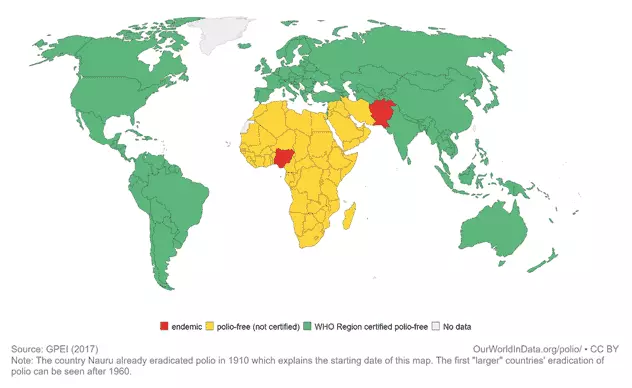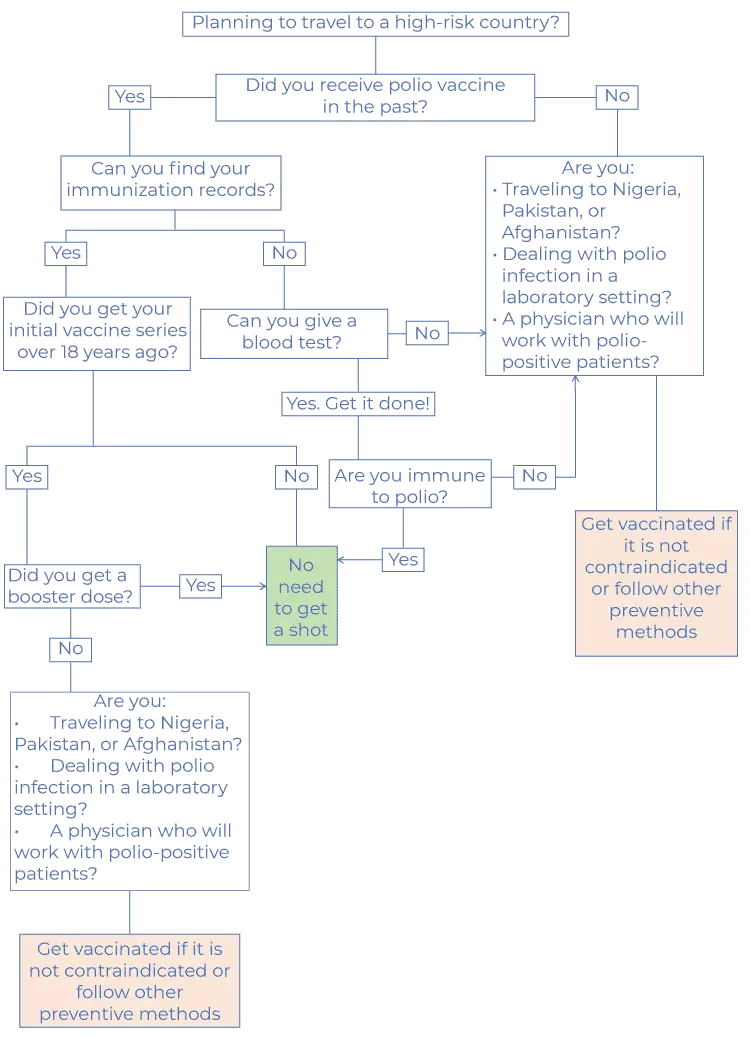Polio vaccine
This is a practical guide to poliomyelitis vaccination.
The best part?
We’ll give you only factual information based on reliable sources and our nearly 20 years of experience in travel medicine.
Contents
At a glance
 Required or recommended? The Centers for Disease Control and Prevention (CDC) recommends it; it’s never required
Required or recommended? The Centers for Disease Control and Prevention (CDC) recommends it; it’s never required  How is poliomyelitis (polio) transmitted? Through the fecal–oral and oral–oral routes (see the details below)
How is poliomyelitis (polio) transmitted? Through the fecal–oral and oral–oral routes (see the details below) Is polio vaccine a part of routine childhood immunization? Yes, four doses of the polio vaccine are given to children as part of routine childhood immunizations
Is polio vaccine a part of routine childhood immunization? Yes, four doses of the polio vaccine are given to children as part of routine childhood immunizations Duration of polio vaccine protection: Lifelong immunity after adult booster dose
Duration of polio vaccine protection: Lifelong immunity after adult booster dose Adult booster necessary? Yes, if you are traveling to a high-risk area
Adult booster necessary? Yes, if you are traveling to a high-risk area

Poliomyelitis (Polio) Vaccine Info
Childhood vaccine schedule
The table below shows the poliomyelitis childhood immunization schedule. Please, check your records to see whether you have received all the needed shots within the needed time intervals.
First shot at 2 months
Second shot at 4 months
Third shot at 6–18 months
Fourth shot at 4–6 years of age
99% – 100%
Polio Vaccine Protection
At least 18 years if all shots are completed
Adult booster schedule
The table below shows the recommended vaccination schedule for people who have completed their poliomyelitis childhood immunizations.
One booster in adulthood for:
Those who do not have vaccine records to check
Those who do not have time for blood work to check for immunity
Those who are raveling to high-risk country
Laboratory workers
Physicians that work with poliomyelitis patients
* The one-dose booster schedule applies only to adults who completed the routine polio routine immunization schedule (four doses).
100%
Polio Vaccine Protection
Lifelong

Where It’s Most Common
Poliomyelitis is being eradicated in most countries. Over the past 30 years, the number of polio cases has decreased by 99%. In 2018, only 33 cases were reported worldwide.
Today, polio is endemic in only three countries:
- Afganistan
- Nigeria
- Pakistan


About Poliomyelitis
Poliomyelitis, or polio, is a viral infection that may cause serious life-threatening complications. Though this infectious disease mainly affects children (and is also known as “infantile paralysis”), infected adults are more likely to develop complications and permanent conditions and to die.
The introduction of vaccines was a major public health achievement that helped eradicate polio in the United States. Before the invention of safe and effective polio vaccines,
[4]
Polio Vaccine
https://www.health.ny.gov/diseases/communicable/polio/vaccine.htm
the disease killed thousands of Americans a year.
In this section, you will find a brief summary of polio and its treatment, transmission, and manifestation.

Polio Vaccination FAQ
Here are the questions our patients frequently ask about the polio vaccination.
[2]
Polio Vaccination
https://www.cdc.gov/vaccines/vpd/polio/index.html
We’ve answered them based on 20 years of being the busiest travel clinic in Midtown Manhattan, New York City.
Let’s dive in!







